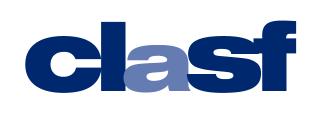
Competition and the State
A CLaSF Workshop
London, Thursday 11th September 2003
The second Competition Law Scholars Forum (CLaSF) Workshop on ‘Competition and the State’ took place on Thursday 11th September 2003 at the London premises of Nottingham Law School, near Grays Inn. It was a great success with seventeen competition scholars from across the European Union ready to discuss and debate a range of papers devoted to the theme of ‘Competition and the State’.
The event was chaired by Dr Alan Riley of Nottingham Law School, and Professor Barry Rodger of Strathclyde University Law School, respectively Chair and Vice Chair of CLaSF who welcomed everyone to the Workshop. A brief report was given of the development of CLaSF, including: the project to increase the number of CLaSF members from continental Europe; discussions with publishers in respect of a scholarly competition law journal; the upgrading of the website; and, links in development with various EU policy think tanks.
The workshop began with Ms Kristina Nordlander of international law firm Cleary Gottlieb Steen and Hamilton, Brussels, in her paper ‘The Treatment of State Guarantees for Financial Institutions under EC State Aid Rules’ provided a brilliant exposition of the complexities of applying EC state aid law where the state provides guarantees to financial institutions. Ms Nordlander examined the difficulties both of analysing state guarantees under the market investor principle and the uncertain scope for recovery once a state guarantee had been deemed state aid. Professor Andrew Evans of Queen’s University Belfast in his paper ‘State Aid Control in the Central and Eastern European States’ set out some of the key difficulties in applying the state aid acquis in Central and Eastern Europe. In particular, he argued that the Commission may have to accept the adaptation will be required by the Community as well as by the CEE states. Dr Andreas Bartosch of the EU State Aid Institute Berlin in his paper ‘State Aid and Public Services: The Implications of the Altmark Judgment’ set out the background to the case, outlined the decision of the European Court of Justice in the case, and then assessed the implications of the decision. Professor Christopher Bovis of the Lancashire Law School delivered a paper on ‘Competition, Public Procurement and State Aids’, in which he examined the links between procurement law and state aid, and the scope for public authorities for utilising procurement law to side-step the state aid provisions of the EC Treaty.
The workshop then turned to a discussion of the implications of the recent landmark case in BetterCare Group Limited v. Director General of Fair Trading [2002] CAT 7 which concerned the scope of the concept of an undertaking and thereby the application of UK competition law. As the conceptual issues in the case are common to both European and other national competition law systems, this part of the workshop provoked a wide-ranging discussion and debate amongst the participants. This session commenced with an overview of the issues involved in BetterCare from Professor Barry Rodger of Strathclyde University Law School in his paper ‘The Competition Act 1998 and State Entities as Undertakings. Promises to be an Interesting Debate’. Mr Jeremy Scholes of the Faculty of Law, Sheffield University, then delivered a second paper on BetterCare. In this second paper, ‘Bettercare and Local Government’, the ruling in BetterCare was examined in the context of the activities of local government. Mr Scholes highlighted some of the difficulties in applying BetterCare and EC case law on the undertaking/public services divide to the actual operations and activities of the public sector.
The final session of the workshop concerned the application of the concept of services of a general interest. In the first paper, Professor Erika Szyszczak of the Faculty of Law, Leicester University in her paper ‘Competition Policy and the Liberalised EU Market’ explored the impact of the creation of the single market upon the competition policy of the Union. In particular, the paper compared the justifications available under the single market and competition rules and the particular problem of how to deliver and protect services of general economic interest in competitive markets. The final paper of the workshop was delivered by Professor Philippa Watson of Nottingham Law School, in her paper ‘Services of General Interest’. In that paper Professor Watson laid out the current law and the major conflicts in the field between those who support an extensive and narrow interpret of services of general interest.
The proceedings were concluded by Dr Riley and Professor Rodger providing an outline of the agenda of the CLaSF Management Board that would be held the following day. They thanked all the speakers and participants for taking part, and asked speakers to prepare their papers for publication as CLaSF Working Papers. After thanks to the support of Nottingham Law School for providing premises and refreshments, the workshop closed, with participants continuing discussions in a local hostelry, and thereafter dinner. It was agreed that this second CLaSF workshop had been a great success. The quality of the papers had been high and CLaSF proved once again superb vehicle for formal and informal discussion of competition law in a focussed but friendly environment.
The CLaSF would like to thank the following sponsors for supporting the event:-
• ©2003-2009 Angus MacCulloch & Andrew
Matthews •

